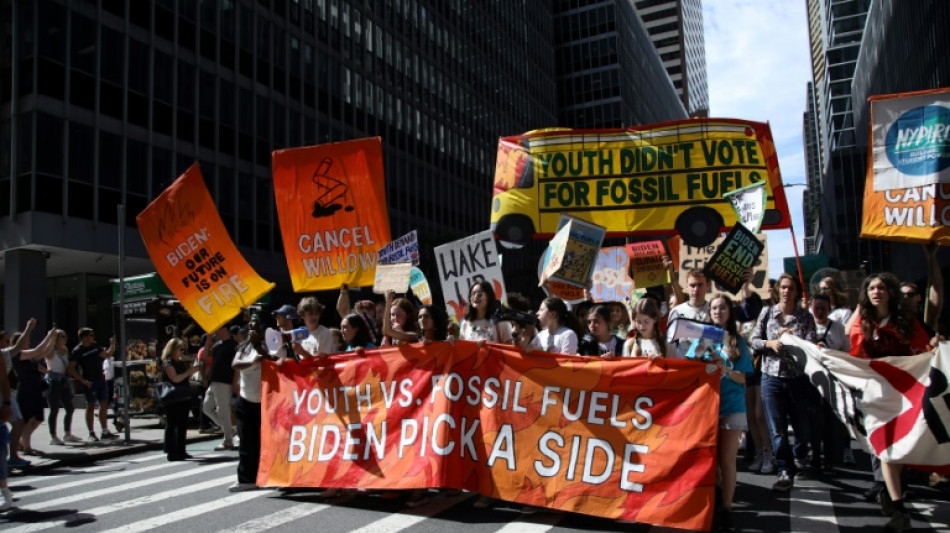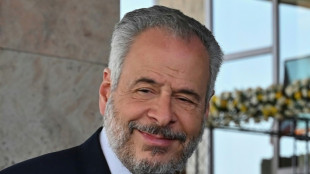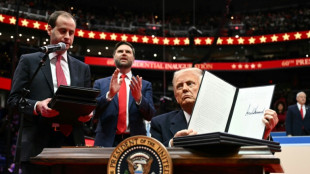

Climate crisis has 'opened the gates to hell' UN chief tells summit
UN Secretary-General Antonio Guterres on Wednesday told world leaders humanity's addiction to fossil fuels had "opened the gates to hell" as he kicked off a climate meeting where leading polluters China and the United States were conspicuously absent.
Despite increasing extreme weather events and record-shattering global temperatures, greenhouse gas emissions continue to rise and oil and gas companies reap handsome profits.
Guterres has thus billed the "Climate Ambition Summit" as a "no nonsense" forum where leaders or cabinet ministers will announce specific actions that deliver on their commitments under the Paris Agreement.
In his opening speech, he evoked 2023's "horrendous heat" and "historic fires," but stressed: "The future is not fixed: It is for leaders like you to write.
"We can still limit the rise in global temperature to 1.5 degrees. We can still build a world of clear air, green jobs and affordable clean power for all," he said, referring to the target seen as needed to avoid long-term climate catastrophe.
The bar for the podium was set high, with the UN chief making clear that only leaders who had made concrete plans to achieve net-zero greenhouse emissions would be allowed to speak.
After receiving more than 100 applications to take part, the UN finally released a list on Tuesday night of 41 speakers which did not include China, the United States, the United Kingdom, Japan or India.
Several major leaders didn't bother making the trip to New York for this year's UN General Assembly, including President Xi Jinping of China and Prime Minister Rishi Sunak from the United Kingdom, who said he was too busy.
US President Joe Biden, who addressed the General Assembly on Tuesday, sent his climate envoy John Kerry to the meeting -- although Kerry won't be permitted to speak in the segment reserved for "movers and doers."
"There's no doubt that the absence of so many leaders from the world's biggest economies and emitters will clearly have an impact on the outcomes of the summit," Alden Meyer of climate think tank E3G said.
He blamed competing issues -- from the Ukraine conflict to US-China tensions and rising economic uncertainty -- but also the lobbying power of the fossil fuel industry.
Catherine Abreu, executive director of nonprofit Destination Zero, said it was "perhaps a good-news story that we see Biden not being given a speaking slot at the summit" because the United States is continuing to expand fossil fuel projects even as it makes historic investments in renewables.
"I think about this as being a correction from past summits, where leaders have been given the opportunity to take credit for climate leadership on the global stage, while they continue to pursue plans to develop fossil fuels, and continue driving the climate crisis back at home," she added.
While the United States won't take the rostrum, California will be represented by Governor Gavin Newsom. From Britain, London Mayor Sadiq Khan will also attend.
- Broken promises -
The event is the biggest climate summit in New York since 2019, when Greta Thunberg stunned the world with her "How Dare You" speech before the UN.
Anger is building among climate activists, particularly younger people, who turned out in thousands last weekend for the "March to End Fossil Fuels" in New York.
Observers are eager however to see what Canadian Prime Minister Justin Trudeau and European Union President Ursula von der Leyen say both on their own goals and on financing commitments for the developing world.
Advanced economies vowed in 2009 to channel $100 billion to less developed countries by the year 2020 -— a promise that was broken —- even as much of the funding that was mobilized came in the form of loans.
Meanwhile, a "loss and damage" fund aimed at providing financial assistance to nations most vulnerable and impacted by the effects of climate change has still not been operationalized.
There are some bright spots, including the announcement that Colombia and Panama are joining a grouping called the Powering Past Coal Alliance -- particularly notable as Colombia is the world's sixth biggest coal exporter.
K.Cairstiona--NG



